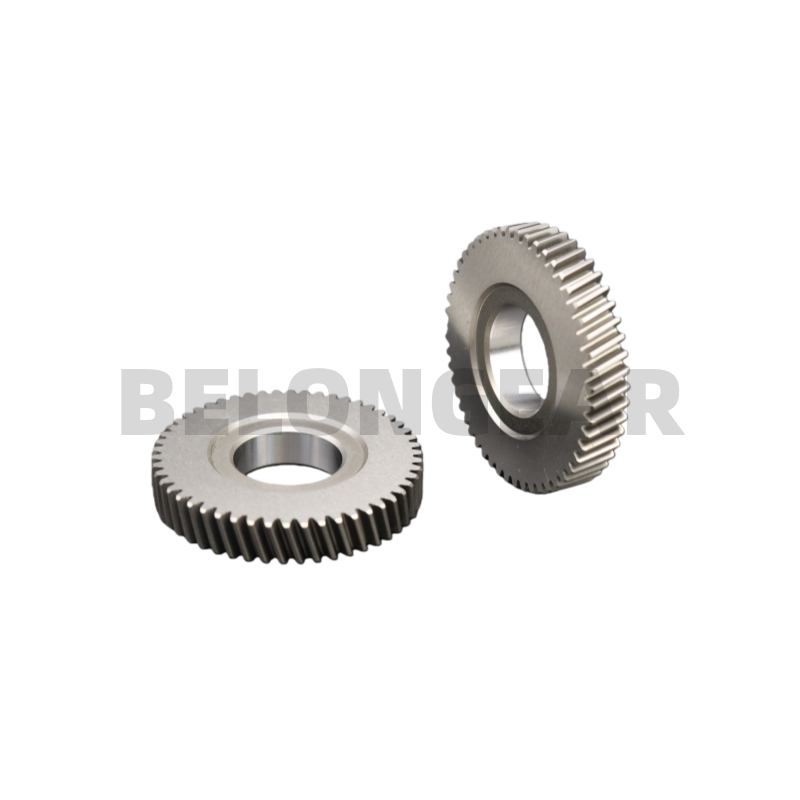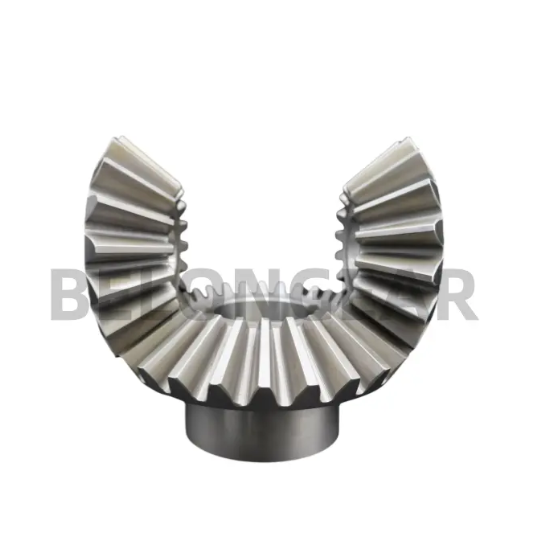The Power Behind the Precision: A Comprehensive Guide to Drilling Machine Gears
In the vast landscape of heavy industry, from railway construction to aerospace manufacturing, the drilling machine remains one of the most fundamental and indispensable tools. Whether it is a portable magnetic drill, a massive radial arm drill, or a specialized electric rail drilling machine, the ability to penetrate metal, rock, and concrete is essential.
However, while the motor provides the energy and the drill bit does the cutting, the true hero of the operation is often hidden inside the metal casing. It is the gearbox. The transmission system—specifically the gears within it determines the torque, the speed, the efficiency, and ultimately, the lifespan of the machine.

For industry leaders looking for reliability, the quality of these gears is non-negotiable. This is where manufacturers like Belon Gear step in, bridging the gap between raw motor power and precise industrial application.
1. The Physics of Drilling: Why Gears Matter
To understand the importance of high quality gears, one must first understand the physics of drilling. An electric motor, by design, is most efficient when spinning at high speeds often between 1,500 to 10,000 RPM. However, drilling through hard materials like high-carbon steel rails or titanium alloys requires a different approach.
If a drill bit spins too fast without sufficient force, it generates excessive friction heat, burning the bit and work hardening the material. Successful drilling requires torque (rotational force) rather than just raw speed.
This is the primary function of the drilling machine gearbox: Speed Reduction and Torque Amplification.
The gear train reduces the high input speed of the motor to a manageable, high-torque output speed for the spindle. For example, a gear ratio of 10:1 effectively multiplies the motor’s torque by ten. If the gears fail to handle this multiplied force, the machine stalls or breaks. This is why Belon Gear focuses heavily on material integrity and geometric precision—to ensure that when the motor pushes, the gear delivers.
2. Critical Gear Types in Drilling Machines
Different drilling applications require different gear configurations. A leading manufacturer like Belon Gear produces a variety of gear types tailored to specific mechanical architectures.
A. Spur Gears
In standard, general-purpose drilling machines, spur gears are common. They feature straight teeth parallel to the gear axis. They are excellent for transferring motion between parallel shafts. While they are cost-effective and efficient, they can be noisy at high speeds.
B. Helical Gears
For high-end industrial drills, Helical Gears are the preferred choice. Unlike spur gears, helical teeth are cut at an angle to the face of the gear. This allows for gradual engagement—teeth slide into contact rather than banging together.
The Benefit: This results in smoother operation, significantly higher load capacity, and quieter performance. Belon Gear specializes in precision-ground helical gears that reduce vibration, which is critical for maintaining hole accuracy.
C. Spiral bevel gears (The Right Angle Solution)
This is crucial for specialized equipment like Electric Rail Drilling Machines. Often, due to space constraints on a railway track or inside a complex assembly, the motor cannot be mounted in line with the drill bit. The motor might be vertical, while the drilling happens horizontally.
The Role: Spiral Bevel Gears transfer power 90 degrees around a corner.
The Belon Standard: Belon Gear’s spiral bevel gears are manufactured with a curved tooth flank. This spiral shape increases the "contact ratio," meaning more tooth surface is sharing the load at any given time compared to straight bevel gears. This is essential for the heavy shock loads encountered when a drill bit breaks through a steel rail.

3. The "Hard Gear" Advantage: Material and Heat Treatment
In the prompting of industrial specifications, you will often see the term "Hard Gear" or "Hardened Steel." But what does this actually entail, and why does Belon Gear prioritize it?
Drilling involves shock loading. When a drill bit catches on a burr or breaks through the exit side of a workpiece, the gears experience a massive, instantaneous spike in torque. Soft gears would strip or deform under this pressure.
Belon Gear employs a rigorous metallurgical process to create gears that survive these conditions:
The Material: 20CrMnTi Alloy Steel
Belon Gear typically utilizes high-grade low-carbon alloy steels like 20CrMnTi. This material is chosen for its specific response to heat treatment.
The Process: Carburizing and Quenching
The gears are subjected to a carburizing atmosphere at high temperatures, where carbon atoms diffuse into the surface of the steel. Following this, they are quenched (rapidly cooled).
The Result: This creates a "case-hardened" structure.
The Surface (Case): Extremely hard (HRC 58-62). This resists wear, pitting, and scratching.
The Core: Remains softer and ductile. This is vital. If the whole gear were that hard, it would be brittle like glass and snap under impact. The tough core allows the gear to absorb the shock of drilling without cracking.
4. Precision Grinding: The Silence of Efficiency
Heat treatment inevitably distorts steel slightly. A gear that is heat-treated but not finished will be noisy and run hot.
Belon Gear distinguishes itself through advanced Gear Grinding. After the hardening process, the gear teeth are ground to precise tolerances (often DIN Class 5 or 6).
Noise Reduction: In an enclosed workshop, the whine of a gearbox can be deafening. Precision-ground gears mesh perfectly, significantly lowering decibel levels.
Thermal Management: Imperfect gears create friction, which creates heat. In a drilling machine, heat is the enemy. Efficient power transmission through ground gears keeps the gearbox cooler, protecting the lubricant and seals.
Longevity: Even microscopic high spots on a gear tooth can become stress concentrators, leading to premature fatigue failure. Grinding removes these imperfections.
5. Spotlight Application: The Electric Rail Drilling Machine
Let us look deeper into a specific application where Belon Gear’s components shine: The Electric Rail Drilling Machine.
Railway maintenance is a brutal environment. The tracks are made of high-manganese steel, designed specifically to be difficult to wear down. Drilling holes for fishplates or signaling cables requires immense torque and rigidity. Furthermore, the machines must be portable and compact so workers can clear the track quickly.
The Gearbox Challenge: The gearbox in a rail drill must be small enough to fit between sleepers/ties but strong enough to twist a 30mm cutter through hardened rail steel.
The Solution: This is the classic use case for Belon Gear’s Spiral Bevel Gears.
Compact Power: The right-angle drive allows the motor to sit parallel to the track (safely out of the way) while the spindle drives into the rail web.
Shock Absorption: Rail drilling is intermittent and aggressive. The spiral bevel design handles the "interrupted cut" vibration better than any other gear type.
Reliability: A gear failure on a remote railway line halts maintenance and can delay trains. The reliability of Belon’s carburized steel ensures that maintenance crews can trust their tools shift after shift.
6. Common Failure Modes and How to Prevent Them
Even the best gears can fail if mistreated. However, choosing high-quality gears from the outset mitigates these risks. Here are common issues in drilling gearboxes and how Belon Gear designs against them:
A. Pitting (Surface Fatigue)
The Issue: Small craters form on the gear teeth due to repeated high surface pressure.
The Defense: High surface hardness (HRC 58-62) and proper lubrication. Belon’s heat treatment depth ensures the hard "case" is thick enough to support the load.
B. Scuffing (Adhesive Wear)
The Issue: Under heavy loads and high speeds, the oil film breaks down, and metal-to-metal contact welds the teeth momentarily, tearing the surface.
The Defense: Precision grinding provides a smoother surface finish, which helps maintain the hydrodynamic oil film, preventing metal contact.
C. Tooth Breakage (Overload)
The Issue: The entire tooth snaps off at the root.
The Defense: This is a core toughness issue. By maintaining a ductile core through controlled quenching, Belon Gear ensures the tooth can flex slightly under shock loads without snapping.
7. The Future of Drilling Gears: Customization and Integration
As drilling technology advances—moving toward automated CNC drilling centers and battery-operated portable magnetic drills—the demands on the gearbox evolve.
Manufacturers are no longer looking for off-the-shelf generic gears. They need partners who can co-engineer solutions.
Belon Gear offers OEM and ODM services, working directly with drill manufacturers to optimize gear geometry.
Micro Geometry Modification: Belon engineers can modify the profile of the gear tooth (tip relief or crowning) to account for the slight bending of shafts under load. This ensures that even when the machine is straining at maximum capacity, the gears maintain a perfect contact patch.
Lightweighting: For portable drills, weight is critical. High-strength alloy steels allow for smaller gears to carry the same load, reducing the overall weight of the tool.
8. Why Industry Professionals Choose Belon Gear
In the B2B sourcing world, the cost of a component is not just its purchase price—it is the cost of failure. A cheap gear that saves $5 upfront but causes a $5,000 machine breakdown and three days of production delay is an expensive liability.
Belon Gear has positioned itself as a partner for reliability. By adhering to strict ISO and DIN quality standards, investing in state-of-the-art CNC gear hobbing and grinding machinery, and maintaining rigorous metallurgical control, they provide the "heart" that keeps industrial drilling machines beating.
Summary of Value:
Material Expertise: Utilizing 20CrMnTi and similar high grade alloys.
Heat Treatment Mastery: Achieving the perfect balance of hard case and tough core.
Geometric Precision: Ground gears for silent, cool, and efficient running.
Application Knowledge: Understanding the specific needs of rail, magnetic, and radial drills.
Belon Gear understands this responsibility. With a commitment to precision manufacturing, advanced heat treatment, and custom engineering, Belon Gear ensures that when the switch is flipped, the power is delivered smoothly, efficiently, and relentlessly.
View more gears application .
Post time: Nov-19-2025




